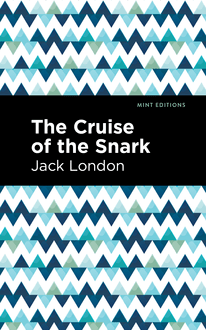-
 Univers
Univers
-
 Ebooks
Ebooks
-
 Livres audio
Livres audio
-
 Presse
Presse
-
 Podcasts
Podcasts
-
 BD
BD
-
 Documents
Documents
-
- Cours
- Révisions
- Ressources pédagogiques
- Sciences de l’éducation
- Manuels scolaires
- Langues
- Travaux de classe
- Annales de BEP
- Etudes supérieures
- Maternelle et primaire
- Fiches de lecture
- Orientation scolaire
- Méthodologie
- Corrigés de devoir
- Annales d’examens et concours
- Annales du bac
- Annales du brevet
- Rapports de stage
La lecture à portée de main
Vous pourrez modifier la taille du texte de cet ouvrage
Découvre YouScribe en t'inscrivant gratuitement
Je m'inscrisDécouvre YouScribe en t'inscrivant gratuitement
Je m'inscrisEn savoir plus
Vous pourrez modifier la taille du texte de cet ouvrage
En savoir plus

Description
The Cruise of the Snark (1911) is a work of travel literature by American writer Jack London. In 1906, after achieving early success as an author of novels and short stories, London began dreaming of the adventures of his youth. Inspired, he spent a fortune to build a 45-foot yacht complete with two sails and a 70-horsepower engine, powerful enough to carry him across the Pacific. Envisioning a seven-year journey, London and his wife Charmian set sail on the Snark with a small crew in 1907. Over the next two years, they would visit Hawaii—where London learned to surf and visited a leper colony—and the Marquesas Islands—made famous by Herman Melville’s first novel, Typee. Other stops included Tahiti, Bora Bora, Fiji, Samoa, and the Solomon Islands. During the voyage, London learned the art of sailing and celestial navigation, ensuring that his travelogue—which he filled with photographs from the journey—would be authentic and instructive. In 1909, the Snark was forced to end its voyage in Guadalcanal so that London, suffering from infection, could be taken to a hospital in Sydney. To help cover costs, the Snark was sold in Australia in 1909, and the Londons returned to America via Ecuador later that year. In addition to The Cruise of the Snark, London would publish numerous essays and articles about the trip, and his wife Charmian also wrote three books of her own on the subject. With a beautifully designed cover and professionally typeset manuscript, this edition of Jack London’s The Cruise of the Snark is a classic of American literature reimagined for modern readers.
Sujets
Informations
| Publié par | Mint Editions |
| Date de parution | 07 mai 2021 |
| Nombre de lectures | 0 |
| EAN13 | 9781513275161 |
| Langue | English |
| Poids de l'ouvrage | 1 Mo |
Informations légales : prix de location à la page 0,0500€. Cette information est donnée uniquement à titre indicatif conformément à la législation en vigueur.
Extrait
The Cruise of the Snark
Jack London
The Cruise of the Snark was first published in 1911.
This edition published by Mint Editions 2021.
ISBN 9781513270166 | E-ISBN 9781513275161
Published by Mint Editions®
minteditionbooks.com
Publishing Director: Jennifer Newens
Design & Production: Rachel Lopez Metzger
Typesetting: Westchester Publishing Services
C ONTENTS I. F OREWORD II. T HE I NCONCEIVABLE AND M ONSTROUS III. A DVENTURE IV. F INDING O NE ’ S W AY A BOUT V. T HE F IRST L ANDFALL VI. A R OYAL S PORT VII. T HE L EPERS OF M OLOKAI VIII. T HE H OUSE OF THE S UN IX. A P ACIFIC T RAVERSE X. T YPEE XI. T HE N ATURE M AN XII. T HE H IGH S EAT OF A BUNDANCE XIII. T HE S TONE - FISHING OF B ORA B ORA XIV. T HE A MATEUR N AVIGATOR XV. C RUISING IN THE S OLOMONS XVI. B ÊCHE DE M ER E NGLISH XVII. T HE A MATEUR M.D. B ACKWORD
I
F OREWORD
I t began in the swimming pool at Glen Ellen. Between swims it was our wont to come out and lie in the sand and let our skins breathe the warm air and soak in the sunshine. Roscoe was a yachtsman. I had followed the sea a bit. It was inevitable that we should talk about boats. We talked about small boats, and the seaworthiness of small boats. We instanced Captain Slocum and his three years’ voyage around the world in the Spray .
We asserted that we were not afraid to go around the world in a small boat, say forty feet long. We asserted furthermore that we would like to do it. We asserted finally that there was nothing in this world we’d like better than a chance to do it.
“Let us do it,” we said… in fun.
Then I asked Charmian privily if she’d really care to do it, and she said that it was too good to be true.
The next time we breathed our skins in the sand by the swimming pool I said to Roscoe, “Let us do it.”
I was in earnest, and so was he, for he said:
“When shall we start?”
I had a house to build on the ranch, also an orchard, a vineyard, and several hedges to plant, and a number of other things to do. We thought we would start in four or five years. Then the lure of the adventure began to grip us. Why not start at once? We’d never be younger, any of us. Let the orchard, vineyard, and hedges be growing up while we were away. When we came back, they would be ready for us, and we could live in the barn while we built the house.
So the trip was decided upon, and the building of the Snark began. We named her the Snark because we could not think of any other name—this information is given for the benefit of those who otherwise might think there is something occult in the name.
Our friends cannot understand why we make this voyage. They shudder, and moan, and raise their hands. No amount of explanation can make them comprehend that we are moving along the line of least resistance; that it is easier for us to go down to the sea in a small ship than to remain on dry land, just as it is easier for them to remain on dry land than to go down to the sea in the small ship. This state of mind comes of an undue prominence of the ego. They cannot get away from themselves. They cannot come out of themselves long enough to see that their line of least resistance is not necessarily everybody else’s line of least resistance. They make of their own bundle of desires, likes, and dislikes a yardstick wherewith to measure the desires, likes, and dislikes of all creatures. This is unfair. I tell them so. But they cannot get away from their own miserable egos long enough to hear me. They think I am crazy. In return, I am sympathetic. It is a state of mind familiar to me. We are all prone to think there is something wrong with the mental processes of the man who disagrees with us.
The ultimate word is I like . It lies beneath philosophy, and is twined about the heart of life. When philosophy has maundered ponderously for a month, telling the individual what he must do, the individual says, in an instant, “I like ,” and does something else, and philosophy goes glimmering. It is I like that makes the drunkard drink and the martyr wear a hair shirt; that makes one man a reveller and another man an anchorite; that makes one man pursue fame, another gold, another love, and another God. Philosophy is very often a man’s way of explaining his own I like .
But to return to the Snark , and why I, for one, want to journey in her around the world. The things I like constitute my set of values. The thing I like most of all is personal achievement—not achievement for the world’s applause, but achievement for my own delight. It is the old “I did it! I did it! With my own hands I did it!” But personal achievement, with me, must be concrete. I’d rather win a water-fight in the swimming pool, or remain astride a horse that is trying to get out from under me, than write the great American novel. Each man to his liking. Some other fellow would prefer writing the great American novel to winning the water-fight or mastering the horse.
Possibly the proudest achievement of my life, my moment of highest living, occurred when I was seventeen. I was in a three-masted schooner off the coast of Japan. We were in a typhoon. All hands had been on deck most of the night. I was called from my bunk at seven in the morning to take the wheel. Not a stitch of canvas was set. We were running before it under bare poles, yet the schooner fairly tore along. The seas were all of an eighth of a mile apart, and the wind snatched the whitecaps from their summits, filling. The air so thick with driving spray that it was impossible to see more than two waves at a time. The schooner was almost unmanageable, rolling her rail under to starboard and to port, veering and yawing anywhere between south-east and south-west, and threatening, when the huge seas lifted under her quarter, to broach to. Had she broached to, she would ultimately have been reported lost with all hands and no tidings.
I took the wheel. The sailing-master watched me for a space. He was afraid of my youth, feared that I lacked the strength and the nerve. But when he saw me successfully wrestle the schooner through several bouts, he went below to breakfast. Fore and aft, all hands were below at breakfast. Had she broached to, not one of them would ever have reached the deck. For forty minutes I stood there alone at the wheel, in my grasp the wildly careering schooner and the lives of twenty-two men. Once we were pooped. I saw it coming, and, half-drowned, with tons of water crushing me, I checked the schooner’s rush to broach to. At the end of the hour, sweating and played out, I was relieved. But I had done it! With my own hands I had done my trick at the wheel and guided a hundred tons of wood and iron through a few million tons of wind and waves.
My delight was in that I had done it—not in the fact that twenty-two men knew I had done it. Within the year over half of them were dead and gone, yet my pride in the thing performed was not diminished by half. I am willing to confess, however, that I do like a small audience. But it must be a very small audience, composed of those who love me and whom I love. When I then accomplish personal achievement, I have a feeling that I am justifying their love for me. But this is quite apart from the delight of the achievement itself. This delight is peculiarly my own and does not depend upon witnesses. When I have done some such thing, I am exalted. I glow all over. I am aware of a pride in myself that is mine, and mine alone. It is organic. Every fibre of me is thrilling with it. It is very natural. It is a mere matter of satisfaction at adjustment to environment. It is success.
Life that lives is life successful, and success is the breath of its nostrils. The achievement of a difficult feat is successful adjustment to a sternly exacting environment. The more difficult the feat, the greater the satisfaction at its accomplishment. Thus it is with the man who leaps forward from the springboard, out over the swimming pool, and with a backward half-revolution of the body, enters the water head first. Once he leaves the springboard his environment becomes immediately savage, and savage the penalty it will exact should he fail and strike the water flat. Of course, the man does not have to run the risk of the penalty. He could remain on the bank in a sweet and placid environment of summer air, sunshine, and stability. Only he is not made that way. In that swift mid-air moment he lives as he could never live on the bank.
As for myself, I’d rather be that man than the fellows who sit on the bank and watch him. That is why I am building the Snark . I am so made. I like, that is all. The trip around the world means big moments of living. Bear with me a moment and look at it. Here am I, a little animal called a man—a bit of vitalized matter, one hundred and sixty-five pounds of meat and blood, nerve, sinew, bones, and brain,—all of it soft and tender, susceptible to hurt, fallible, and frail. I strike a light back-handed blow on the nose of an obstreperous horse, and a bone in my hand is broken. I put my head under the water for five minutes, and I am drowned. I fall twenty feet through the air, and I am smashed. I am a creature of temperature. A few degrees one way, and my fingers and ears and toes blacken and drop off. A few degrees the other way, and my skin blisters and shrivels away from the raw, quivering flesh. A few additional degrees either way, and the life and the light in me go out. A drop of poison injected into my body from a snake, and I cease to move—for ever I cease to move. A splinter of lead from a rifle enters my head, and I am wrapped around in the eternal blackness.
Fallible and frail, a bit of pulsating, jelly-like life—it is all I am. About me are the great natural forces—colossal menaces, Titans of destruction, unsentimental monsters that have less concern for me than I have for the grain of sand I crush under my foot. They have no concern at all for me. They do not know me. They are uncons
-
 Univers
Univers
-
 Ebooks
Ebooks
-
 Livres audio
Livres audio
-
 Presse
Presse
-
 Podcasts
Podcasts
-
 BD
BD
-
 Documents
Documents
-
Jeunesse
-
Littérature
-
Ressources professionnelles
-
Santé et bien-être
-
Savoirs
-
Education
-
Loisirs et hobbies
-
Art, musique et cinéma
-
Actualité et débat de société
-
Jeunesse
-
Littérature
-
Ressources professionnelles
-
Santé et bien-être
-
Savoirs
-
Education
-
Loisirs et hobbies
-
Art, musique et cinéma
-
Actualité et débat de société
-
Actualités
-
Lifestyle
-
Presse jeunesse
-
Presse professionnelle
-
Pratique
-
Presse sportive
-
Presse internationale
-
Culture & Médias
-
Action et Aventures
-
Science-fiction et Fantasy
-
Société
-
Jeunesse
-
Littérature
-
Ressources professionnelles
-
Santé et bien-être
-
Savoirs
-
Education
-
Loisirs et hobbies
-
Art, musique et cinéma
-
Actualité et débat de société
- Cours
- Révisions
- Ressources pédagogiques
- Sciences de l’éducation
- Manuels scolaires
- Langues
- Travaux de classe
- Annales de BEP
- Etudes supérieures
- Maternelle et primaire
- Fiches de lecture
- Orientation scolaire
- Méthodologie
- Corrigés de devoir
- Annales d’examens et concours
- Annales du bac
- Annales du brevet
- Rapports de stage











